ENHANCING RELATIONSHIPS & WORKING WITH FAMILIES SPRING 2024 SOWK 487W WEEK 03 JACOB CAMPBELL, PH.D. LICSW AT HERITAGE UNIVERSITY
Slide 1

Slide 2

WEEK 03 AGENDA CONTINUING TO LEARN ABOUT FAMILIES Review family system framework Discuss family engagement Practice with starting services Implementing irst/second order strategies f SPRING 2024 SOWK 487 WITH JACOB CAMPBELL, PH.D. LICSW AT HERITAGE UNIVERSITY
Slide 3

SOCIAL WORK CLUB IN THE TRI-CITIES SPRING 2024 SOWK 487 WITH JACOB CAMPBELL, PH.D. LICSW AT HERITAGE UNIVERSITY
Slide 4

ASSESSMENT DIMENSIONS CASE SITUATIONS Each group has two situations. Don’t jump ahead. Start with just the irst situation • First Situation: Talk with your group about what type of information you would want to request or what questions you would ask • Second Situation: Choose group members to act out the di erent family roles ff SPRING 2024 SOWK 487 WITH JACOB CAMPBELL, PH.D. LICSW AT HERITAGE UNIVERSITY f FAMILY SYSTEMS FRAMEWORK Homeostasis Boundaries and Boundary Maintenance Family Decision Making, Hierarchy, and Power Family Roles Communication Patterns in Families Family Life Cycle Family Rules Social Environment Family Adaptive Capacity (Stressors and Strengths)
Slide 5

FAMILY ENGAGEMENT CONSIDERATIONS WE NEED TO MAKE AS WE ENGAGE WITH FAMILIES Joining Cultural perspectives on engagement Di erences in communication styles Hierarchical considerations in communication Authority of the social worker Preventing alliances Dynamics of minority status and culture in experience (Hepworth et al., 2022) ff SPRING 2024 SOWK 487 WITH JACOB CAMPBELL, PH.D. LICSW AT HERITAGE UNIVERSITY
Slide 6
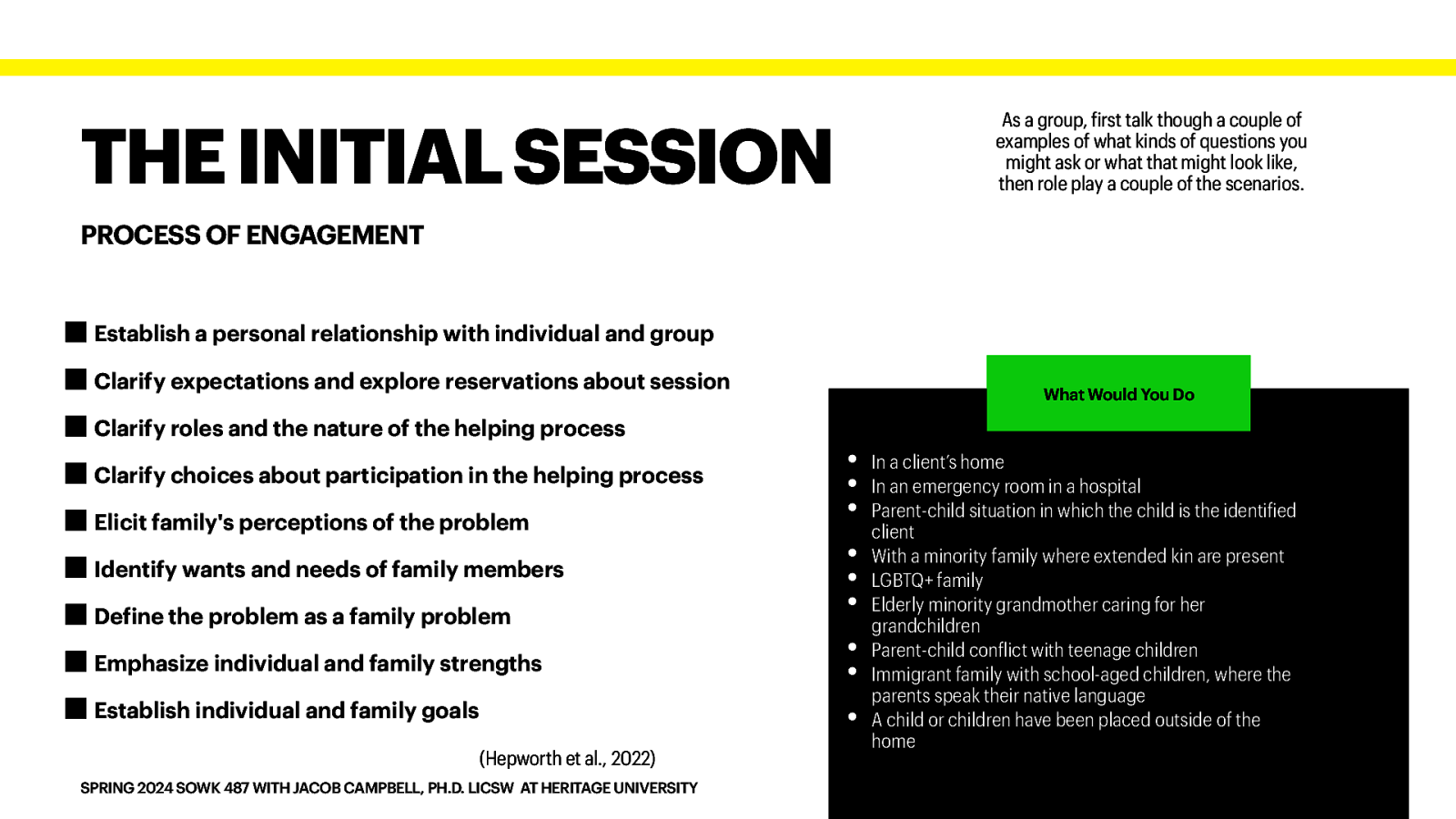
THE INITIAL SESSION As a group, irst talk though a couple of examples of what kinds of questions you might ask or what that might look like, then role play a couple of the scenarios. PROCESS OF ENGAGEMENT Establish a personal relationship with individual and group Clarify expectations and explore reservations about session Clarify roles and the nature of the helping process Clarify choices about participation in the helping process Elicit family’s perceptions of the problem Identify wants and needs of family members De ine the problem as a family problem Emphasize individual and family strengths Establish individual and family goals (Hepworth et al., 2022) f f f f SPRING 2024 SOWK 487 WITH JACOB CAMPBELL, PH.D. LICSW AT HERITAGE UNIVERSITY What Would You Do • • • • • • • • • In a client’s home In an emergency room in a hospital Parent-child situation in which the child is the identi ied client With a minority family where extended kin are present LGBTQ+ family Elderly minority grandmother caring for her grandchildren Parent-child con lict with teenage children Immigrant family with school-aged children, where the parents speak their native language A child or children have been placed outside of the home
Slide 7
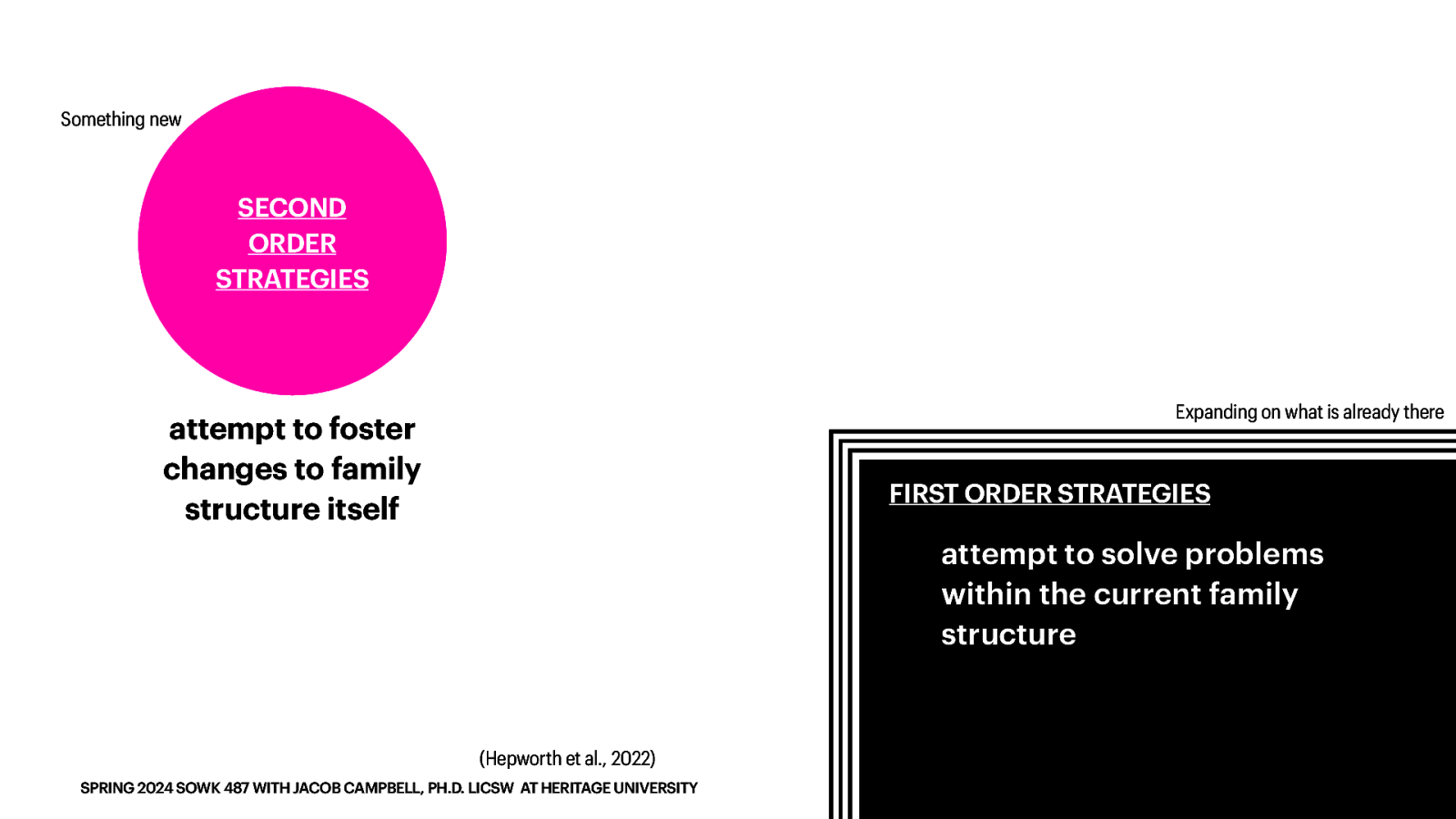
Something new SECOND ORDER STRATEGIES Expanding on what is already there attempt to foster changes to family structure itself FIRST ORDER STRATEGIES attempt to solve problems within the current family structure (Hepworth et al., 2022) SPRING 2024 SOWK 487 WITH JACOB CAMPBELL, PH.D. LICSW AT HERITAGE UNIVERSITY
Slide 8
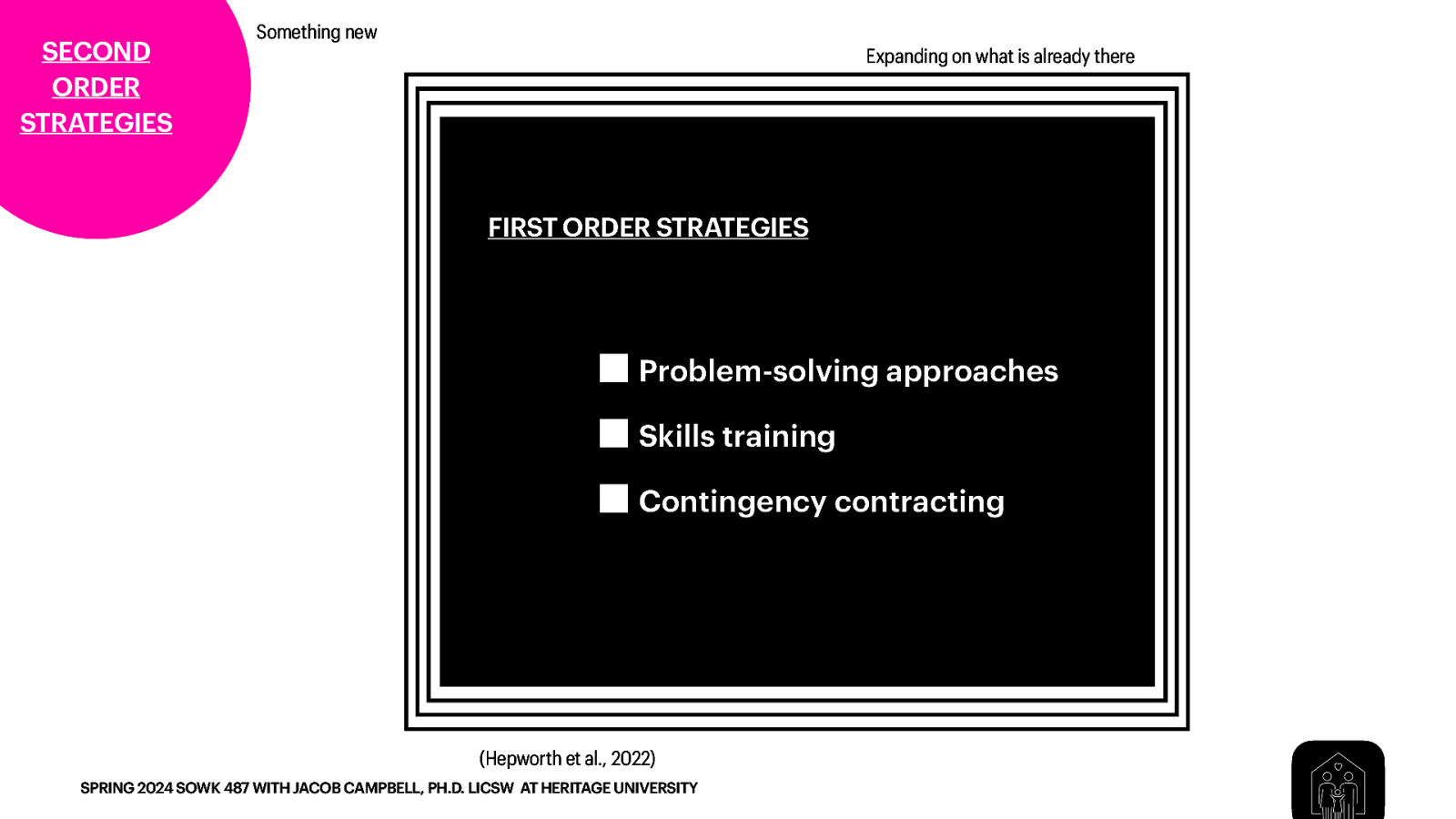
SECOND ORDER STRATEGIES Something new Expanding on what is already there FIRST ORDER STRATEGIES Problem-solving approaches Skills training Contingency contracting (Hepworth et al., 2022) SPRING 2024 SOWK 487 WITH JACOB CAMPBELL, PH.D. LICSW AT HERITAGE UNIVERSITY
Slide 9
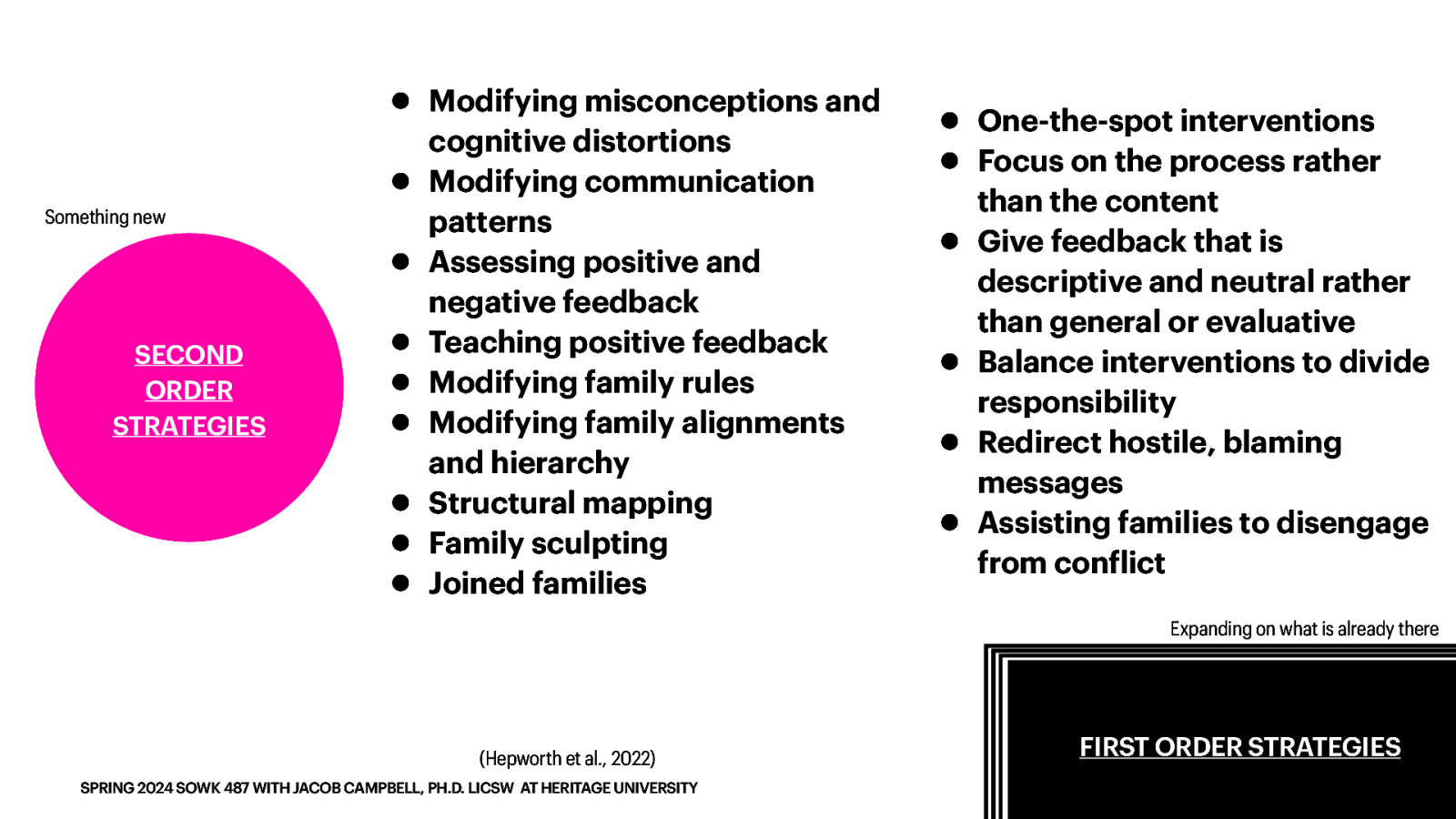
Something new SECOND ORDER STRATEGIES • Modifying misconceptions and cognitive distortions • Modifying communication patterns • Assessing positive and negative feedback • Teaching positive feedback • Modifying family rules • Modifying family alignments and hierarchy • Structural mapping • Family sculpting • Joined families (Hepworth et al., 2022) f SPRING 2024 SOWK 487 WITH JACOB CAMPBELL, PH.D. LICSW AT HERITAGE UNIVERSITY • One-the-spot interventions • Focus on the process rather than the content • Give feedback that is • • • descriptive and neutral rather than general or evaluative Balance interventions to divide responsibility Redirect hostile, blaming messages Assisting families to disengage from con lict Expanding on what is already there FIRST ORDER STRATEGIES
Slide 10
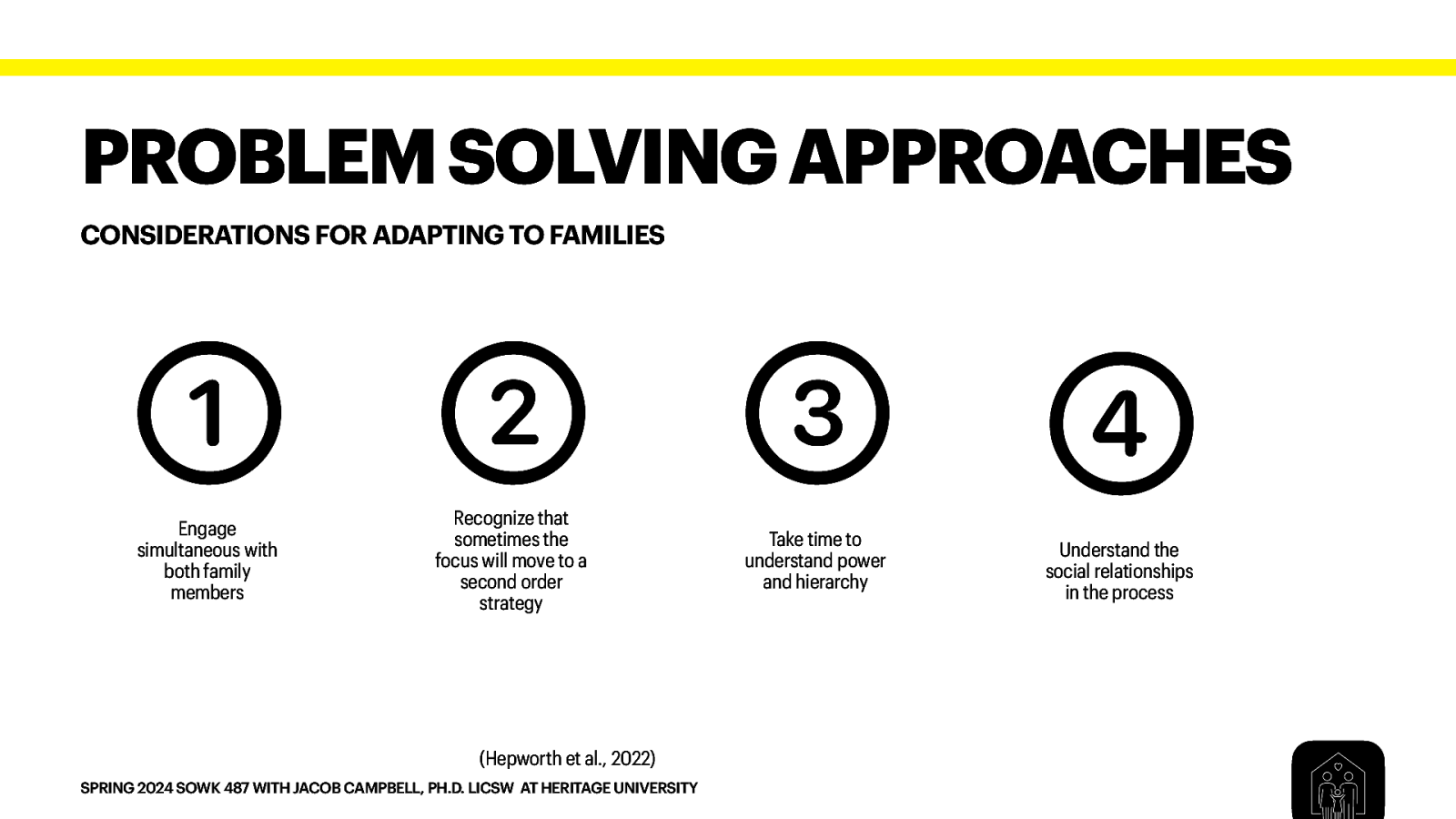
PROBLEM SOLVING APPROACHES CONSIDERATIONS FOR ADAPTING TO FAMILIES Engage simultaneous with both family members Recognize that sometimes the focus will move to a second order strategy (Hepworth et al., 2022) SPRING 2024 SOWK 487 WITH JACOB CAMPBELL, PH.D. LICSW AT HERITAGE UNIVERSITY Take time to understand power and hierarchy Understand the social relationships in the process
Slide 11

Slide 12

15 FAIR FIGHTING RULES SPRING 2024 SOWK 487 WITH JACOB CAMPBELL, PH.D. LICSW AT HERITAGE UNIVERSITY
Slide 13

Validating vs. Invalidating Statements 🙊🙈🙉 SPRING 2024 SOWK 487 WITH JACOB CAMPBELL, PH.D. LICSW AT HERITAGE UNIVERSITY
Slide 14

⏰ SPRING 2024 SOWK 487 WITH JACOB CAMPBELL, PH.D. LICSW AT HERITAGE UNIVERSITY TIME OUTS
Slide 15

WHAT DOES YOUR FAMILY LOOK LIKE WORKING WITH PARTNERS DISCUSS THE FOLLOWING: Identify some examples of verbal or nonverbal metacommunication that you have used. Describe how an unspoken rule in your family governs the behavior of family members. List three societal beliefs and re lect upon how these beliefs may a ect the families that you work with. (Hepworth et al., 2022) ff f SPRING 2024 SOWK 487 WITH JACOB CAMPBELL, PH.D. LICSW AT HERITAGE UNIVERSITY